 Near the Ukrainian border, in Zurawlow, for nearly four weeks, a few peasants have been occupying a field on which Chevron intends to test shale gas extraction. No women’s breasts in sight, no immolation, no punk music echoing in churches and no crowd gathered in public spaces. These peasants survive on the ground on which their ancestors have always lived frugally. Four years ago, Chevron representatives offered to buy land on which they would build a plant, which would create jobs. Some inhabitants signed long American style contracts without even reading them, on the corner of their kitchen tables, after a quick talk.
Near the Ukrainian border, in Zurawlow, for nearly four weeks, a few peasants have been occupying a field on which Chevron intends to test shale gas extraction. No women’s breasts in sight, no immolation, no punk music echoing in churches and no crowd gathered in public spaces. These peasants survive on the ground on which their ancestors have always lived frugally. Four years ago, Chevron representatives offered to buy land on which they would build a plant, which would create jobs. Some inhabitants signed long American style contracts without even reading them, on the corner of their kitchen tables, after a quick talk.
Yet, some peasants dared to oppose their government and the powerful Chevron, running the risk of fines or jail sentences. They did not examine the numerous reports detailing shale gas’s advantages and disadvantages. They did not calculate the amount of chemicals that would remain trapped in their grounds. They were not impressed by the experts who explained that shale gas was better than oil for the environment and consequently for the climate.
They saw water blackening, roads potholing, house walls cracking. They immediately felt the danger: without water, they would be nothing, as would their lands and cattle.
Luckily, a few years earlier, they had met an American film director born of Polish parents who was a genuine camera activist. He had already interviewed shale gas plants’ neighbors in Pennsylvania, filmed the color of their wells’ water and their recently sick skin. Filming the peasants’ fight in Zurawlow, he efficiently protected them and helped them gain international help. Chevron could no longer act secretly as they usually do. Zurawlow’s peasants appeared on social networks, dared to fight the Kafkaesque Polish administration (Chevron’s test do not respect Polish laws protecting these huge water resources). This story ended as a fairy tale, with a film broadcast on Arte (but not in Poland…) and with Chevron’s departure.
Fortunately, Zurawlow’s peasants are suspicious. A year later, Chevron came back to build a fence around a field. At once, they gathered to occupy this field and Kowalski came back with his camera. The bad spy novel reopened, with its phone-tapping, blackmailing and threats. They’ve been living here night and day, regardless of the weather, for four weeks, threatening their cattle’s wealth and their families’ survival.
In spite of much support, the international community doesn’t look at this part of the world where tourists never go. Yet, their fight is ours: they want to have a decent life and politicians that make decisions that include social and environmental outcomes. They refuse to choose between bad and worse (that is between lack of fuel and water pollution with shale gas), as Germany has already done when replacing nuclear plants by coal plants, regardless of carbon emissions. Zurawlow’s peasants are trying to protect their ecosystems, which are ours. They want to choose the destiny of their lands for the good of their grandchildren. It is possible, if governments launch pro-active energy-saving policies, such as those Japan managed to implement after the Fukushima disaster. A profound mentality shift is also necessary: people have to reclaim power on the commons and decide to get out of the development spiral. If we are convinced that degrowth is compulsory, fossil energies will no longer dictate our future and endanger the planet.
Zurawlow’s peasants need strong worldwide support, otherwise Chevron will win here, and tomorrow each of us may face the same risks.
Cécile Renault
Pour en savoir plus :
ARTE – Diffusion de la malédiction du gaz de schiste
mardi, 9 juillet 2013 à 08:55
Rediffusion jeudi 25 juillet à 08H55
(France, 2012, 83mn)
http://occupychevronfr.tumblr.com/


